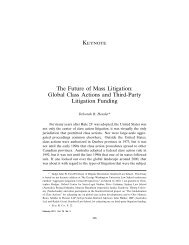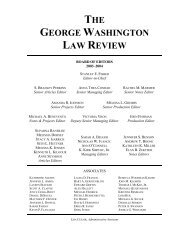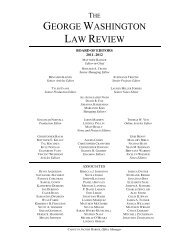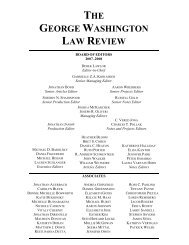View PDF - The George Washington Law Review
View PDF - The George Washington Law Review
View PDF - The George Washington Law Review
You also want an ePaper? Increase the reach of your titles
YUMPU automatically turns print PDFs into web optimized ePapers that Google loves.
2010] Oral History and the Study of the Judiciary 853<br />
presence of the interviewer thus creates the possibility that her interests<br />
and biases will affect the nature of what the interviewee says. Indeed,<br />
in a trivial sense this is certainly true, in that no two interviewers<br />
would generate identical responses. But the risk seems real in a more<br />
significant sense as well. Historians recognize this problem, and sophisticated<br />
interviewers attempt to structure their interviews so as to<br />
minimize the effects. 38<br />
None of this necessarily makes oral history unduly suspect as evidence.<br />
No piece of historical information is flawless. Just as information<br />
gleaned from other sources must be cross-checked against the<br />
available record to assess its accuracy and significance, so must those<br />
who work with oral history steel themselves against easy acceptance<br />
of subjects’ assertions. 39 Historians recognize this. Indeed, the initial<br />
movement toward the use of oral history in the United States was<br />
based in its potential as a replacement for the sorts of written materials—primarily<br />
letters and journals—that became less frequently available<br />
due to cultural and technological shifts. 40 On this view, oral<br />
history serves primarily as a supplement to other sources, aiding in the<br />
depiction, interpretation, and understanding of records and events<br />
rather than standing alone as an authoritative source. 41<br />
<strong>The</strong>re is a use of oral history beyond that which focuses on its<br />
ability to illuminate historical events. This second use draws on oral<br />
history as evidence of interviewees’ perceptions and understandings of<br />
their own history and culture. In this sense oral history functions not<br />
exclusively, or even primarily, as a conduit to the past, but “also provides<br />
insights into the meaning of the individual’s experiences: not just<br />
what happened, but how it was understood and experienced by the<br />
narrator.” 42 Here, of course, oral history’s role may be less supplemental.<br />
In the case of some classes of interviewees, the oral history is<br />
likely to be the only evidence bearing on their personal understanding<br />
of their situation. 43 When that is the case, concerns about the potential<br />
for interviewer-induced bias are at their highest.<br />
ing for posterity and thus for historians in some general sense. But that is not quite the same as<br />
having a specific historian as a prominent part of one’s audience.<br />
38 See Grele, supra note 32, at 54.<br />
39 See RITCHIE, supra note 25, at 27.<br />
40 See Grele, supra note 32, at 44–45.<br />
41 See RITCHIE, supra note 25, at 118–19.<br />
42 See Anna Green, ‘Unpacking’ the Stories, in REMEMBERING: WRITING ORAL HISTORY,<br />
supra note 33, at 9, 12; see also Green, supra note 33, at 2–3.<br />
43 Whether this is appropriate is the subject of some debate. “Some social historians have<br />
accused oral historians of swallowing whole the stories that informants tell them. <strong>The</strong>y argue









